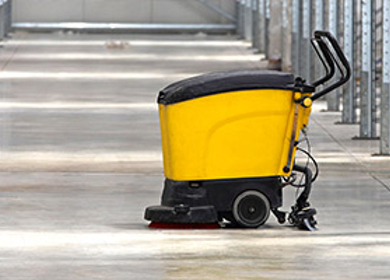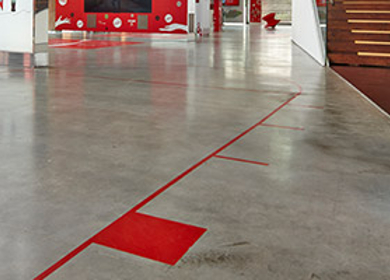Cleaning and maintenance
Prevention is better than cure
Regular maintenance and effective cleaning are crucial operations to ensure that the functional properties of a floor remain unaltered over time. In industrial plants, floorings and coatings play an active part on a daily basis in the production cycle, and for this reason they are subject to considerable stresses – bumps, loads, wear and tear and corrosion – which can cause significant (albeit localized) damage.
It is essential to act quickly to repair damages, however small, and to reinstate the integrity of the surface, thus avoiding further damage to a wider area.
In spaces that are most used for "civil" purposes (offices, changing rooms, etc.), it may be advisable to use products that combine a cleaning action with a surface-protection action, such as waxing products. To meet the requirements of a range of different environments and different uses, Recodi has developed tried-and-test procedures for the cleaning of concrete floors and resin coatings. Below you will find some introductory information on these solutions, but we will be delighted to provide you with any additional information you may require to meet your specific set of needs.

Sweep the floor and wash it with detergent as regularly as required; simple cleaning can be carried out with motorized sweeper, whereas in larger spaces it is advisable to use a brushing machine fitted with black Scotch Brite (or red for a smooth surface) and a solution of water and neutral soap.
The detergent should be diluted as per the manufacturer’s recommendations. The use of warm water will shorten both the time required for the detergent to act and the drying time. Cleaning a concrete surface with aggressive detergents can lead to functional degradation that can only be corrected through the use of resin-based coatings. Bear in mind that synthetic detergents attack the concrete part of the wearing surface; as such, it is fundamental to take care when using them. Do not use any detergent with a pH of below 7. Avoid the use of buffering acids, even if diluted with water. The effectiveness of the cleaning operation is inversely proportional to the degree of finish of the surface. Indeed, the rougher the surface, the higher the temperature or the contact time or the concentration of the detergent has to be.
Cleaning with damp sawdust with wax in an aqueous solution offers the advantage of protecting the surface layer. In the event of frost DO NOT scatter de-icing salts on a concrete surface; use fine sand instead.

Resin-coated floors take time to become fully functional and protective. As such, it is extremely important not to subject them to the traffic of pallet trucks, the storage of materials or contact with liquids (water, alcohol, diluting acids) for a period of at least 3 months from the completion of the laying operations, maintaining a temperature of at least 20°C. For effective cleaning, it is important to identify the most appropriate system, which is constituted by the method used and the cleaning product chosen, since it is the combination of the physical/mechanical action of the machinery and the chemical/detergent action of the product that makes it possible to achieve the desired result.
Considerable attention must be focused on the type of machinery used. If the surface is smooth, it is sufficient to use a scrubber-drier or a single-disc machine equipped with a brushed with medium-hard bristles, or a disc with a low-to-medium abrasive action. If, however, the surface in question is non-slip, it is advisable to use a pressure washer with a 50-bar pressure jet at a maximum temperature of 50°C. In certain cases, it is may be effective to use a brush with medium-soft bristles to reach into the gaps.
Almost all resinous systems, if subject to high temperatures for a given period, display thermoplastic behaviour and so are subject to surface softening to one extent or another. As such, as far back as the design stage, it is important to give some thought to the type of cleaning and the temperature to which the coating will be subject. In general, resinous systems based on synthetic resins (epoxy, polyurethane, methacrylic, etc.) have surface temperature resistance of up to 50°C. Only with certain specific formulations (polyurethane/cement) does it become possible to carry out continuous-heat cleaning at around 140°C.
WE ADVISE AGAINST carrying out the heat cleaning with the addition of a chemical detergent to the water, since the detergent – even if used in low concentrations – can when heated have a highly aggressive chemical action. The basic products that are widely available on the market are generally suitable for use. For stubborn dirt, a product with an abrasive action may be used, but – particularly on coatings of limited thickness – it should not be used frequently, as this will compromise the durability of the floor.
Acid-based products with a moderate acid effect are permissible, on condition that the pH is not below 5. AVOID cleaning and/or disinfectant products containing iodine compounds, because when the react with the pigments used for the formation of the colour they can stain the coating. AVOID all products containing phosphoric acid.
Recocarpet is a protective carpeting solution made using a special, self-adhesive polyethylene that is resistant to solvents, and specifically to ethyl acetate. Recocarpet is easy to apply – just unroll the carpet and glue it to the floor to afford the flooring with a high level of protection. The carpet can be applied to areas of all dimensions.
Recocarpet is highly resistant to chemical agents and is recommended for protecting industrial floors against spills of coatings, resins, inks, glues and other products that are otherwise difficult to remove. It is the ideal solution for the protection of all types of floors, and is suitable for environments or zones where there is a risk of chemical spillage: areas use for printing, mixing rooms, coupling areas, etc.
Thanks to the transparency of the material used, Recocarpet does not alter the appearance of the floor. Easy to remove, it is non-skid and adheres perfect to all types of flooring.
